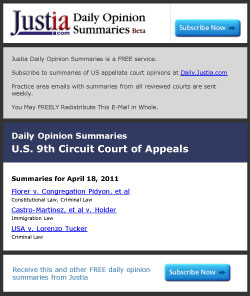 The Judicial Council announced last week that they plan to expand a pilot program to push federal court opinions to FDSys. In theory, that means that all federal court opinions could be published and freely available in the FDSys database soon.
The Judicial Council announced last week that they plan to expand a pilot program to push federal court opinions to FDSys. In theory, that means that all federal court opinions could be published and freely available in the FDSys database soon.
FDSys is the digital repository for federal publications. It is operated by the Government Printing Office. Last year, the Judicial Council announced that it would begin integrating some opinions from PACER into FDSys. It began with opinions from 28 courts (three circuit courts of appeal). In December, I checked up on that and saw that FDSys had slip opinions in it and that they were actually being indexed by Google. I noted that they were a little behind, and they were slip opinions, not the officially published opinion, but hey – better than nothing.
In the latest announcement, the Judicial Council tells us that “the functionality to transfer opinions to FDsys is included in the latest release of CM/ECF which is now available to all courts. Twenty-nine courts participated in the original pilot, and now, all courts may opt to participate in the program.” If I am reading this correctly, federal courts may now opt in to have their opinions transferred to FDSys. It’s not automatic or mandatory.

 CALI has developed a prototype for uploading, storing, and sharing official court opinions called CourtCloud. Elmer Masters, the Director of Internet Development there, calls it a “Dropbox for courts.” The purpose of CourtCloud is to help courts self-publish their opinions.
CALI has developed a prototype for uploading, storing, and sharing official court opinions called CourtCloud. Elmer Masters, the Director of Internet Development there, calls it a “Dropbox for courts.” The purpose of CourtCloud is to help courts self-publish their opinions. Access to opinions and codes is of particular interest to the bloggers at Justia. We complain mightily about private citation formats, paywalls to codes and caselaw online, privatization of court services and filings, and the government’s overall failure to provide us with official, free access to the public record. Last week’s
Access to opinions and codes is of particular interest to the bloggers at Justia. We complain mightily about private citation formats, paywalls to codes and caselaw online, privatization of court services and filings, and the government’s overall failure to provide us with official, free access to the public record. Last week’s  The
The  Of course, FDSys is still very limited. It’s only pulling opinions from a few courts, and it doesn’t seem to be up to date. I searched for a case from October (Windsor v. United States), and could not find anything. The GPO announced last year that its
Of course, FDSys is still very limited. It’s only pulling opinions from a few courts, and it doesn’t seem to be up to date. I searched for a case from October (Windsor v. United States), and could not find anything. The GPO announced last year that its  All of us at Justia – human and pup alike – would like to wish everyone a
All of us at Justia – human and pup alike – would like to wish everyone a 
